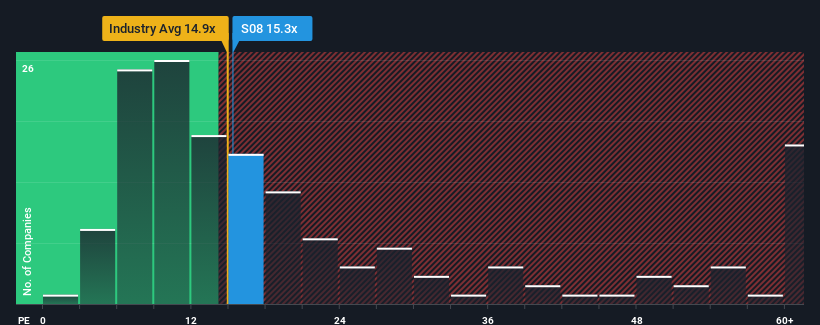Subdued Growth No Barrier To Singapore Post Limited's (SGX:S08) Price
Singapore Post Limited's (SGX:S08) price-to-earnings (or "P/E") ratio of 15.3x might make it look like a sell right now compared to the market in Singapore, where around half of the companies have P/E ratios below 11x and even P/E's below 6x are quite common. However, the P/E might be high for a reason and it requires further investigation to determine if it's justified.
With earnings growth that's superior to most other companies of late, Singapore Post has been doing relatively well. It seems that many are expecting the strong earnings performance to persist, which has raised the P/E. You'd really hope so, otherwise you're paying a pretty hefty price for no particular reason.
See our latest analysis for Singapore Post

Does Growth Match The High P/E?
There's an inherent assumption that a company should outperform the market for P/E ratios like Singapore Post's to be considered reasonable.
Taking a look back first, we see that the company grew earnings per share by an impressive 123% last year. The strong recent performance means it was also able to grow EPS by 113% in total over the last three years. Accordingly, shareholders would have probably welcomed those medium-term rates of earnings growth.
Shifting to the future, estimates from the dual analysts covering the company suggest earnings growth is heading into negative territory, declining 3.9% per year over the next three years. With the market predicted to deliver 7.9% growth per year, that's a disappointing outcome.
With this information, we find it concerning that Singapore Post is trading at a P/E higher than the market. Apparently many investors in the company reject the analyst cohort's pessimism and aren't willing to let go of their stock at any price. Only the boldest would assume these prices are sustainable as these declining earnings are likely to weigh heavily on the share price eventually.
The Final Word
While the price-to-earnings ratio shouldn't be the defining factor in whether you buy a stock or not, it's quite a capable barometer of earnings expectations.
Our examination of Singapore Post's analyst forecasts revealed that its outlook for shrinking earnings isn't impacting its high P/E anywhere near as much as we would have predicted. When we see a poor outlook with earnings heading backwards, we suspect the share price is at risk of declining, sending the high P/E lower. Unless these conditions improve markedly, it's very challenging to accept these prices as being reasonable.
There are also other vital risk factors to consider and we've discovered 2 warning signs for Singapore Post (1 is concerning!) that you should be aware of before investing here.
If P/E ratios interest you, you may wish to see this free collection of other companies with strong earnings growth and low P/E ratios.
New: Manage All Your Stock Portfolios in One Place
We've created the ultimate portfolio companion for stock investors, and it's free.
• Connect an unlimited number of Portfolios and see your total in one currency
• Be alerted to new Warning Signs or Risks via email or mobile
• Track the Fair Value of your stocks
Have feedback on this article? Concerned about the content? Get in touch with us directly. Alternatively, email editorial-team (at) simplywallst.com.
This article by Simply Wall St is general in nature. We provide commentary based on historical data and analyst forecasts only using an unbiased methodology and our articles are not intended to be financial advice. It does not constitute a recommendation to buy or sell any stock, and does not take account of your objectives, or your financial situation. We aim to bring you long-term focused analysis driven by fundamental data. Note that our analysis may not factor in the latest price-sensitive company announcements or qualitative material. Simply Wall St has no position in any stocks mentioned.
About SGX:S08
Singapore Post
Engages in the post and parcel, eCommerce logistics, and property businesses in Singapore and internationally.
Adequate balance sheet with acceptable track record.
Market Insights
Community Narratives




